Contents
Building Your IR
Theory Toolbox
An Introduction to Understanding
World Politics
Edited by
Eric K. Leonard
Shenandoah University
ROWMAN & LITTLEFIELD
Lanham Boulder New York London
Executive Editor: Traci Crowell
Assistant Editor: Mary Malley
Senior Marketing Manager: Kim Lyons
Credits and acknowledgments for material borrowed from other sources, and reproduced with permission, appear on the appropriate page within the text.
Published by Rowman & Littlefield
A wholly owned subsidiary of The Rowman & Littlefield Publishing Group, Inc.
4501 Forbes Boulevard, Suite 200, Lanham, Maryland 20706
www.rowman.com
Unit A, Whitacre Mews, 26-34 Stannary Street, London SE11 4AB, United Kingdom
Copyright 2018 by Rowman & Littlefield
All rights reserved. No part of this book may be reproduced in any form or by any electronic or mechanical means, including information storage and retrieval systems, without written permission from the publisher, except by a reviewer who may quote passages in a review.
British Library Cataloguing in Publication Information Available
Library of Congress Cataloging-in-Publication Data
Names: Leonard, Eric K.
Title: Building your IR theory toolbox : an introduction to understanding
world politics / edited by Eric K. Leonard, Shenandoah University.
Description: Lanham, Maryland : Rowman & Littlefield, [2018] | Includes
bibliographical references and index.
Identifiers: LCCN 2017060478 (print) | LCCN 2018000901 (ebook) | ISBN
9780742567443 (electronic) | ISBN 9780742567429 (cloth : alk. paper) |
ISBN 9780742567436 (pbk. : alk. paper)
Subjects: LCSH: International relationsPhilosophy. | World politics.
Classification: LCC JZ1305 (ebook) | LCC JZ1305 .B85 2018 (print) | DDC
327.101--dc23
LC record available at https://lccn.loc.gov/2017060478
 The paper used in this publication meets the minimum requirements of American National Standard for Information SciencesPermanence of Paper for Printed Library Materials, ANSI/NISO Z39.48-1992.
The paper used in this publication meets the minimum requirements of American National Standard for Information SciencesPermanence of Paper for Printed Library Materials, ANSI/NISO Z39.48-1992.
Printed in the United States of America
Dedication
This book is dedicated to my wife, Lisa Mennella.
Whenever I doubt my abilities or my place in
this profession, you provide the encouragement
and support I need. For that I am eternally grateful.
Contents
Eric K. Leonard
Mark Sachleben
Eric K. Leonard
Eric K. Leonard
Alice D. Ba and Matthew J. Hoffmann
Laura Sjoberg
Rosemary E. Shinko
Eric K. Leonard
Preface
T he creation of this book took a long and winding path. However, the one thing that continuously drove the project was my desire to make International Relations (IR) theory accessible to the typical undergraduate student. In many ways, this passion emerged from my own journey to academia. Upon finally going to college for an education and not for the plethora of other reasons that existed, I landed at a mid-sized state school in New Jersey. Prior to this point, I was not the best student, nor the most attentive, but at William Paterson College I found professors who cared about my future and believed in my potential. These professors understood their students background and their struggles, yet continued to push them academically, but in a way that remained accessible. As a result of this education, when I began teaching almost twenty years ago it was with the same mindset as those that had educated me during my undergraduate years. I entered academia to teach first and research second. My goal was to gain employment at a teaching-oriented institution where I could help undergraduates develop academically.
And this brings me back to this book. In many ways, this book is the embodiment of what I wanted to bring to academia. For years I heard many professors at teaching-oriented institutions talk about the struggles of teaching IR theory in their intro-level class. They talked about the inability of students to understand theory, the lack of interest by the many non-political science students in their class to engage theory, and the lack of literature written for their student population. I can fully attest to the fact that this struggle was real. For a stretch of several years I toyed with the idea of eliminating or at least minimizing the theory section of my intro class. However, if the goal of my class was to help students understand the world around them, then theory was necessary.
The other problem was the shortened theory sections that were now a standard in the introductory textbooks. Many of the authors of these textbooks were providing one to two pages on each theory, only providing an overview of the key concepts with no real depth to the discussion. This was only pushing the discipline towards the problem discussed above, minimizing or in some cases eliminating theory from the introductory course.
It was only after articulating these issues to Rowman & Littlefield editor Susan McEachern that the idea of correcting this problem began to take shape. Susan McEacherns encouragement pushed me to consider this textbook as a way to bring theory back into the typical undergraduate classroom in a way that students could both understand and apply. I can only hope that this small book provides a means for instructors to bring theory back into the Introduction to International Politics classroom so that all students can gain access to the academic tools that will assist them in understanding the world around them.
Acknowledgments
T his book would not have been possible without the constant support and assistance of Rowman & Littlefields vice president and senior acquisition editor Susan McEachern. This book emerged from a conversation with Susan at the annual International Studies Association conference far too many years ago. Despite the length of time since that initial meeting and the many delays in this project, Susan kept encouraging me to complete the project and provided unending support and feedback. For that support I am truly grateful. Along the same lines, I am grateful to all of the contributors to this textbook for their willingness to stay with the project and provide a wonderful resource for the students of IR theory. Alice Ba, Matthew Hoffmann, Mark Sachleben, Rose Shinko, and Laura Sjoberg were wonderful colleagues and contributors throughout this process, and I thank them for their unending patience. This book also benefited greatly from the comments, insights, and criticisms of the following reviewers: Christopher Cook, Bob Denemark, Rebeccah Evans, Michael Jacobs, Brian Klunk, Jyotika Saksena, Gregory Williams, and Jeremy Youde. I would be remiss if I failed to thank my students at Shenandoah University. In many ways this project is about those students and my desire to make IR theory accessible to them. I employed many earlier drafts in my Introduction to International Politics class and I thank my students for their insights on how to improve each chapter. I also owe a tremendous debt to my institution, Shenandoah University. The course release time, sabbatical, and several faculty development grants SU awarded me were critical pieces to completing this project. Also, the institutions encouragement to improve my teaching and the acknowledgment that the drafting of a textbook would assist in that process were fundamental parts of a successful completion of this manuscript. Finally, I would like to thank my wife, Lisa Mennella, and my three kids, Nico, Stefani, and Mathieu. They provided an emotional support throughout this process that simply cannot be measured. Thank you for always being there for me, even when the struggles of writing made me irritable.

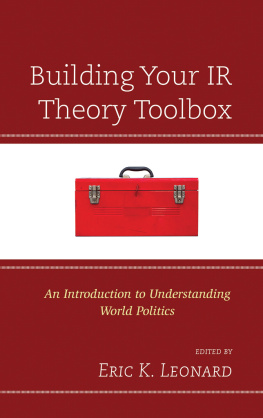


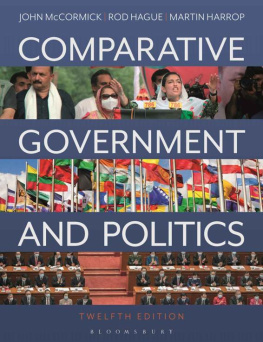
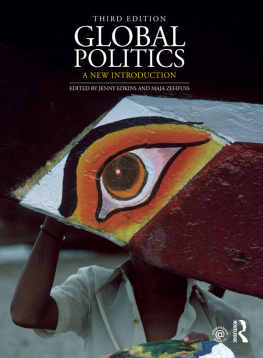
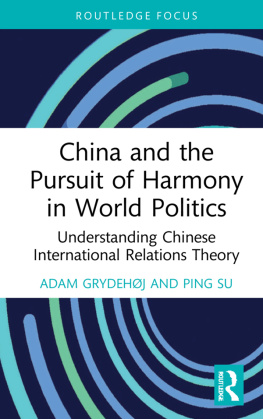
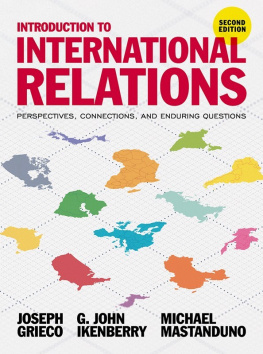
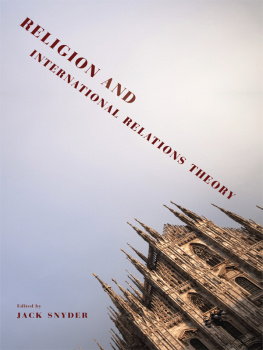
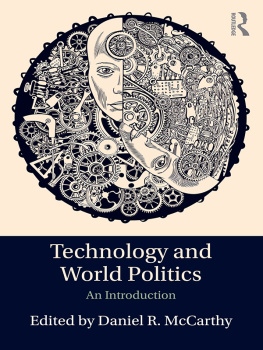
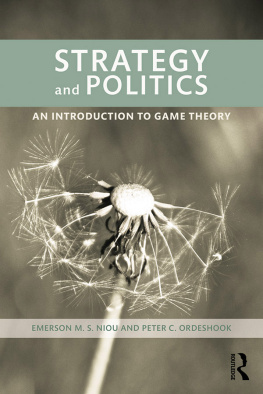

 The paper used in this publication meets the minimum requirements of American National Standard for Information SciencesPermanence of Paper for Printed Library Materials, ANSI/NISO Z39.48-1992.
The paper used in this publication meets the minimum requirements of American National Standard for Information SciencesPermanence of Paper for Printed Library Materials, ANSI/NISO Z39.48-1992.